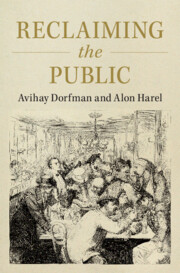Book contents
- Reclaiming the Public
- Reclaiming the Public
- Copyright page
- Dedication
- Contents
- Acknowledgments
- Introduction
- 1 A Public Conception of Political Authority
- 2 Law as Standing
- 3 Speaking in a Different Voice
- 4 Inherently Public Goods
- 5 Against Privatization as Such
- 6 Public Ownership
- 7 Why Not Artificial Intelligence?
- Concluding Remarks
- Index
5 - Against Privatization as Such
Published online by Cambridge University Press: 22 February 2024
- Reclaiming the Public
- Reclaiming the Public
- Copyright page
- Dedication
- Contents
- Acknowledgments
- Introduction
- 1 A Public Conception of Political Authority
- 2 Law as Standing
- 3 Speaking in a Different Voice
- 4 Inherently Public Goods
- 5 Against Privatization as Such
- 6 Public Ownership
- 7 Why Not Artificial Intelligence?
- Concluding Remarks
- Index
Summary
The typical arguments concerning privatization are instrumental, relying heavily on comparing the performance of a public functionary with that of its private counterpart. This chapter challenges this approach for leaving unaddressed other important consequences of shifting responsibilities to private entities. Privatization cuts off the link between processes of decision-making and the citizens and, therefore, erodes political engagement and its underlying notion of shared responsibility. Consequently, privatization undermines individuals’ public autonomy.
The effects of privatization are not restricted to the question of whether a public prison is better or worse qua prison than its private counterpart, or whether private forestry is better or worse qua forestry than its public counterpart. Stripping the state of its responsibilities erodes public responsibility, for privatization is not only the transformation of detention centers, trains, tax inquiry offices, forestry operations, and so on, considered one service at a time. It is also the transformation of our political system and public culture from ones characterized by robust shared responsibility and political engagement to ones characterized by fragmentation and sectarianism.
Keywords
- Type
- Chapter
- Information
- Reclaiming the Public , pp. 124 - 148Publisher: Cambridge University PressPrint publication year: 2024



